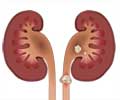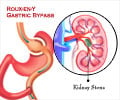Patients with cystinuria need treatment options as the currently available medications are decades old, not efficacious and associated with side effects.
Highlights
- Alpha-lipoic acid (ALA) is an anti-oxidant which naturally occurs in the body and in spinach, rice bran, brussel sprouts, organ meat.
- ALA is also used as a supplement to //treat nerve-related symptoms of diabetes and prevents cell damage.
- Recently, ALA is found to dissolve cysteine crystals that is formed in the kidneys.
TOP INSIGHT
Alpha Lipoic acid increased the solubility of the cystine stones in mice affected with cystinuria. This could be used as a treatment as the current methods involve surgery or shock wave lithotripsy.
"The effects were dramatic and unprecedented in this field," said Pankaj Kapahi, PhD, a professor at the Buck Institute and a senior co-author of the study, who noted that affected mice usually start developing cystine-laden kidney stones by three months of age.
"We were able to prevent stones from developing in young animals, and we significantly slowed the development of stones in animals that were already exhibiting the condition. We are excited that these results are moving to a clinical trial."
Senior co-author Marshall Stoller, MD, heads the urinary stone division at UCSF's Department of Urology and has had to perform repeat surgeries on patients with the disease. "These patients are in desperate need of new options," he said, adding that most currently available medications for cystinuria are decades old, not efficacious and associated with side effects.
Cystine stones don't always respond to extracorporeal shock wave therapy aimed at breaking the stones into small pieces to allow for spontaneous stone passage, and that dietary modifications have minimal impact on the disease.
In addition to providing hope for patients suffering from cystinuria, the research also uncovered a new role for alpha-lipoic acid. "Because it's an antioxidant, we thought the supplement would promote cystine metabolism in the mice," said Tiffany Zee, PhD, Study author.
"We estimate that there could be up to 100 metabolites that interact with cystine in human urine and there are differences in the metabolic systems between mice and humans," said Neelanjan Bose, PhD, a joint postdoc at the Buck Institute and the Department of Urology at UCSF and a co-author of the paper.
"Our goal is to find the best way to exploit the benefits of alpha-lipoic acid, which means we need to drill down into the mechanisms involved in its activity," Bose said.
Stoller is currently recruiting cystinuria patients for a clinical trial which will run for three years at UCSF. "While we have been able to improve surgical techniques for these patients over the last three decades, it's time that we solve the problem of these stones forming in the first place, and thus eliminate the need for surgery," he said.
Even though researchers plan to test alpha-lipoic acid on other genetic models of kidney stone disease, Stoller said it's not time for patients who have had "garden variety" kidney stones to rely on alpha-lipoic acid to prevent stone recurrence. Those stones are primarily composed of calcium; the supplement has not been tested in such animal models and may not work against them.
Reference
- Tiffany Zee et al., Alpha-lipoic acid prevents kidney stones in mouse model of rare genetic disease, Nature Medicine (2017) http://dx.doi.org/10.1038/nm.4280.
Source-Medindia
 MEDINDIA
MEDINDIA





 Email
Email










